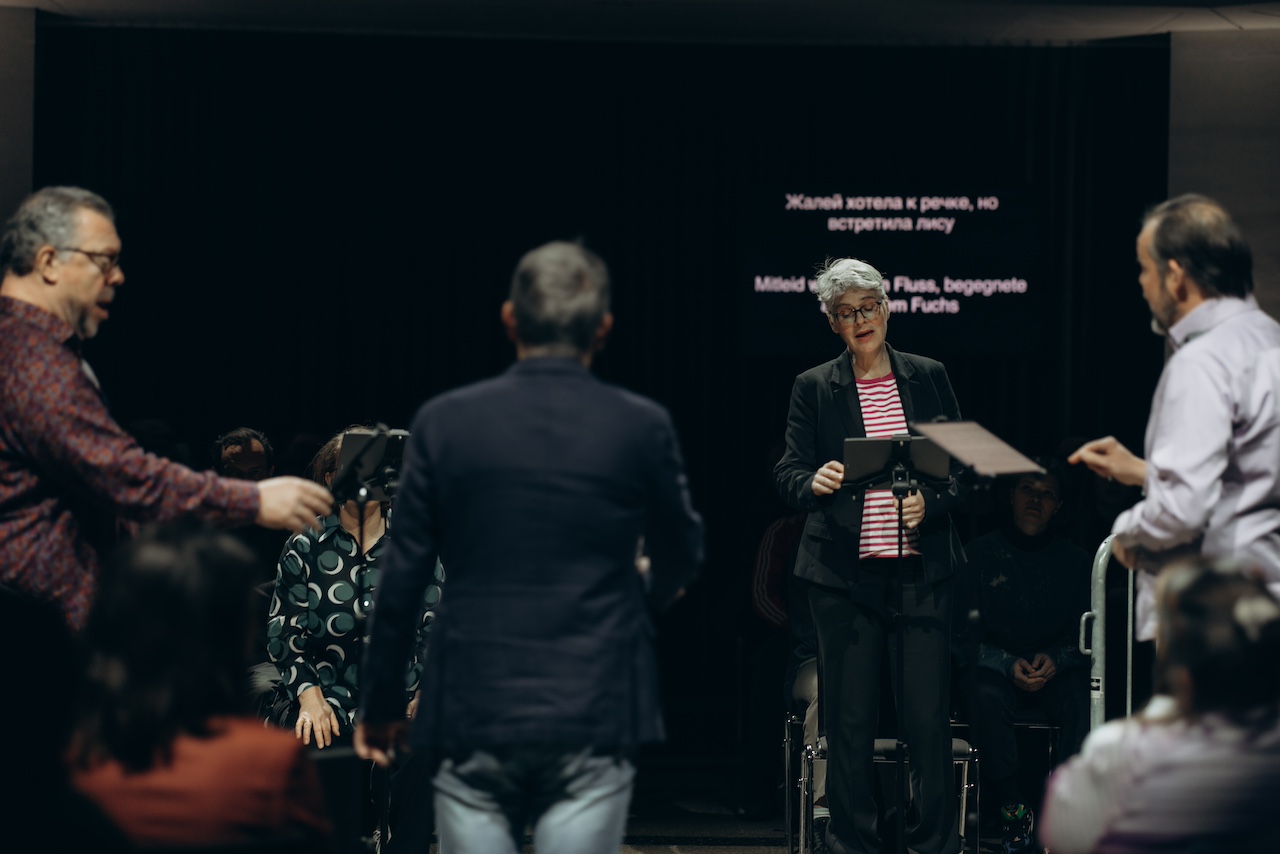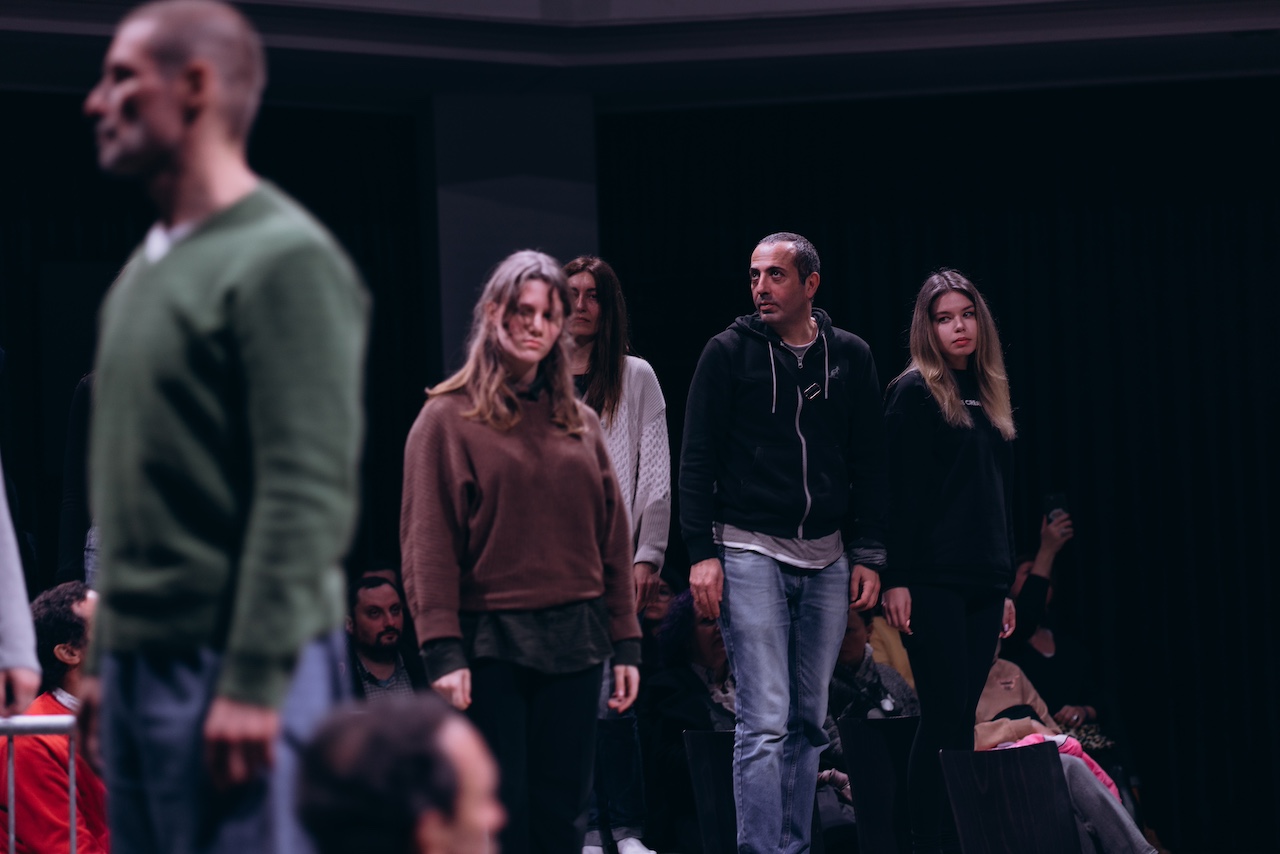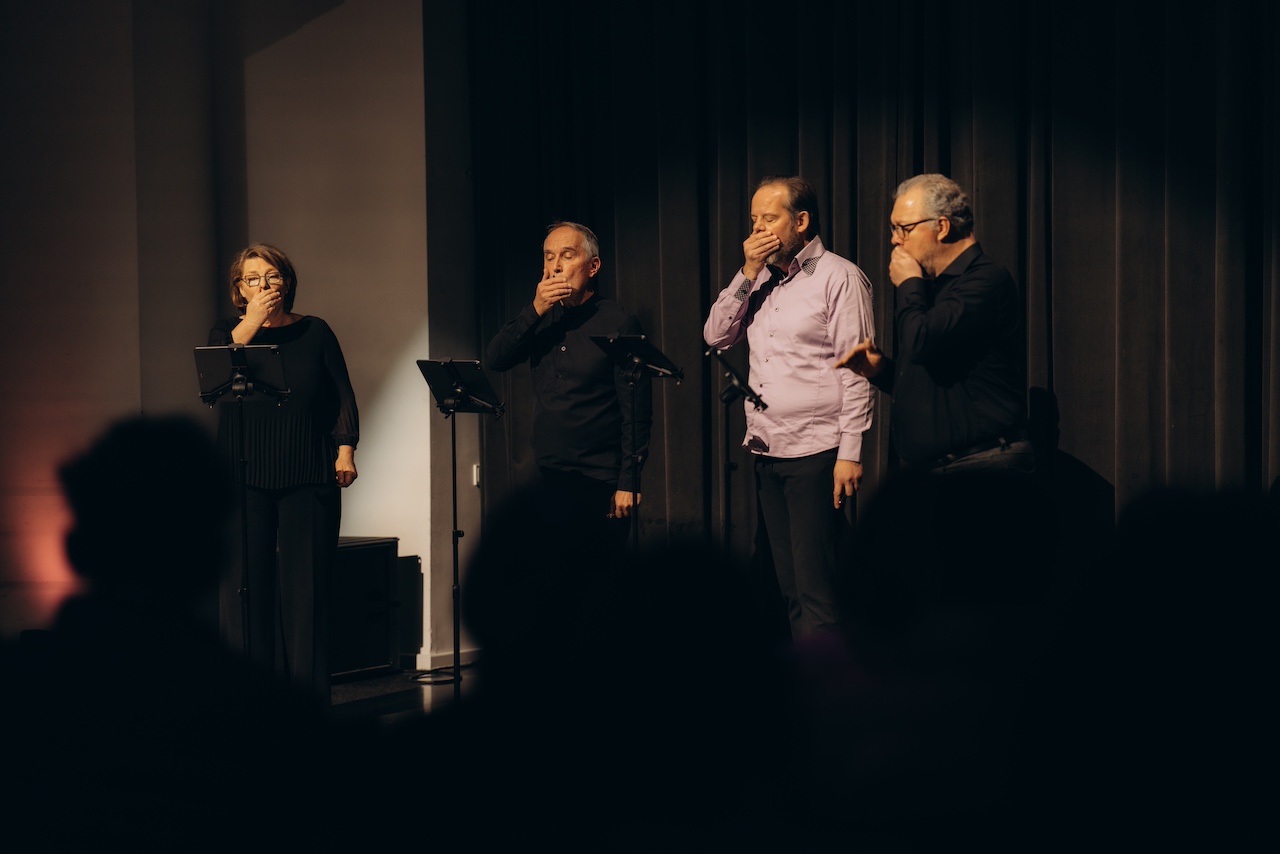The first event was the panel discussion ‘Belarusian Art in Exile: Who cares?’, which brought together Belarusian artists Ludmila Pogodina and Uladzimir Hramovich and was moderated by Jakob Racek, head of the Information Department at the Goethe-Institut’s Munich headquarters.
«The 2020 protests against Alexander Lukashenko and his regime marked a rare instance of Western European attention turned towards Belarus. This interest waned with the Belarusian authorities’ brutal suppression of the protests, almost fully disappearing as a result of Russia’s ongoing full-scale invasion of Ukraine. Protest participants have been persecuted, imprisoned, or forced into exile, and artists are a key target of these repressive actions. Many have found themselves abroad, including in Germany. They often struggle to survive–but continue to create. Is their art-making a form of resistance, a way to envision a future for Belarus? Or is it a way for the artists to stay afloat and survive in exile? For whom are Belarusian artists’ working today–or, to formulate the question more sharply–who cares about their art?»–said the announcement of the panel, which took place as part of the Voices Festival discussion programme, curated by Dr. Andrei Zavadski–an author and researcher working at the intersections of memory studies, museum studies, public history and media studies, with a focus on Eastern Europe.
As an opening question for the discussion, Jakob Racek asked Ludmila Pogodina about the idea behind her artistic project »DIS/LOCATION RE/VISITED«, which presents personal stories of people with the experience of exile from Iran, Colombia, South Africa, Belarus and other countries. Among the participants in the project was another panellist, Uladzimir Hramovich.
»The project basically started as an attempt to keep doing something, to keep making art, because right after I left, I was in a very complicated mental state, and for the first six months I think I was just going to doctors trying to understand where I was and what was going to happen next.
So, the only tool that was available to me to make art was the Polaroid camera–and that was kind of a very satisfying way to make art and photography that I’ve been doing for many years now. And I just took pictures of people–basically I started taking pictures of friends that I would find in exile. <…>
One of the most important things for me, after being exiled, is to put Belarus into a larger context«, told Ludmila.
She also mentioned that the aim of the project was not only to tell personal stories, but to reflect on exile retrospectively through the history of the heroes’ families–so that the ancestors of one of the project participants had been exiled many times, generations before.
Another interesting detail of this multidisciplinary project is that each person was also asked to share a song from their home countries, creating a soundtrack to the roots of migration.
The discussion continued with the story of Uladzimir, who was arrested for taking photographs.
»We were detained with my partner and artist Lesia Pcholka at the beginning of 2021, and we just wanted to take a photo and send it to our courtyard, still like during the protests in Belarus. It was the same day that Navalny came back to Moscow and was arrested, so I think it was a kind of solidarity guest.
We just wanted to take photos, but a bus passed us–and without any identification, people in masks just grabbed us. That’s it. I spent about 15 days in prison with a whole bouquet of repression and violence and all these things like super cold prison cells–et cetera and a lot of people just in one room… Yeah. After that we spent maybe two months in Belarus and the police started to search, tried to find us, so and we decided to leave Belarus, we were forced to leave, and first we moved to Ukraine, to Kiev«–shared Uladzimir.
At this point in the discussion, the problem faced by every Belarusian in exile was mentioned: it is no longer possible to obtain documents from the Belarusian authorities abroad–everyone has to return to the country to obtain documents, which is impossible if you are politically persecuted at home.
Another topic of conversation was the possibility for each artist in exile to avoid becoming an expert on the subject of exile and to continue to be an artist with his own artistic themes and methods. It is particularly difficult when a person has moved from the artistic bubble in Belarus to another bubble of exiled artists, destined to end up in a new country.
»I think the bubbles in Berlin are pretty big,« said Uladzimir, »and I’m still trying to find new people, so it’s like a super-new experience. Maybe it’s a bubble, but if you grew up in a kind of «aquarium”–now you’re in a bigger »aquarium«”.
Speaking about sources of support in exile, Ludmila said that her regular visits to Berlin from 2007 to 2015 inspired her to maintain community and cultural activities in Minsk during the so-called ‘thaw’ in Belarus. She mentioned that she was privileged to have her pre-existing music/journalist/friends and colleagues network when she finally found herself in exile in Berlin, and found a huge support in finding a feminist, queer and literary community upon arrival.
Another point that emerged from the panel was that people who come to Germany after the protests in Belarus in 2020 will need to understand how the systems work in a new country, such as establishing a culture, the tax system and dealing with bureaucracy.
Among the things that help to find strength and inspiration in the situation of facing serious problems of mental state and bureaucracy, Ludmila mentioned her cat, community and nature (More information on this topic can be found in the series of interviews.
»Talks in Exile« with Belarusian artists Vika Biran, Nadya Sayapina, Maria Komarova and Dasha Brian, conducted by Ludmila Pogodina for platformB).
Uladzimir noted that he finds power in his ability to speak not only for himself, but also for those who must remain silent because of possible persecution or current imprisonment.
Talking about how Berlin has changed in the last decade, Ludmila said: »I perceived this city as offering more free speech and less police violence compared to where we come from. However, over the past year, we’ve witnessed both censorship and police brutality. I’ve experienced a sort of PTSD reaction to certain videos from protests, as well as hearing about spaces being shut down, denied funding, or exhibitions being canceled. It all feels too familiar.
So I wasn’t prepared for that, that wasn’t the Berlin I was coming back to, so I think they triggered that feeling of insecurity and uncertainty again, and in general that frustration of «where can our home be now?” or »where do we belong?« and »are we allowed to talk about things?« because we have to be careful again, and self-censorship is our other expertise and we really know how to deal with it”.
»We came here to speak« remarked Uladzimir »this is the only thing we can do–we can’t do a lot but at least we can represent it, at least we can present or introduce the important issues«.
Continuing the discussion, Jakob Racek recalled Viktor Martinowisch’s article for the FAZ, which was written as a letter to German society from the future, that might not happen and has already happened in Belarus. His question to the artists was whether they had some kind of similar message, mentioning the same trend in different European countries today.
Uladzimir spoke of a sense of déjà vu, and Ludmila stated: »Be careful and take responsibility <…> My only hope is that people will be more empathetic and kinder, because it’s getting scarier and scarier. <…> Be responsible and support people who need it more«.
Ludmila addressed to non-democratic voters and mentioned that if they »vote against someone else’s rights now–it will fire back later–as stripping people of human rights will inevitably affect everyone«.
These statements were followed by a question from the audience as to what special message the artists could address to German society, who can vote and influence the political direction of the country (a right that non-citizens don’t have)?
The answer was to analyse what’s happening, think critically and always check the information. »If you think that a democratic institution is working well, it will not be like that forever, so it can always be worse«–concluded Uladzimir.
The discussion ended with the question of which songs could become the soundtrack of Minsk and Berlin for the exiled artists.
For Ludmila it would be »Dance on my own« by Anastasia Rydlevskaya for Minsk and Bob Vylan’s »Makes me violent« for Berlin, and for Uladzimir it would be Danchyk’s »Schumniye Biaryozy« for Minsk and Knife’s »Pass this on« for Berlin.




